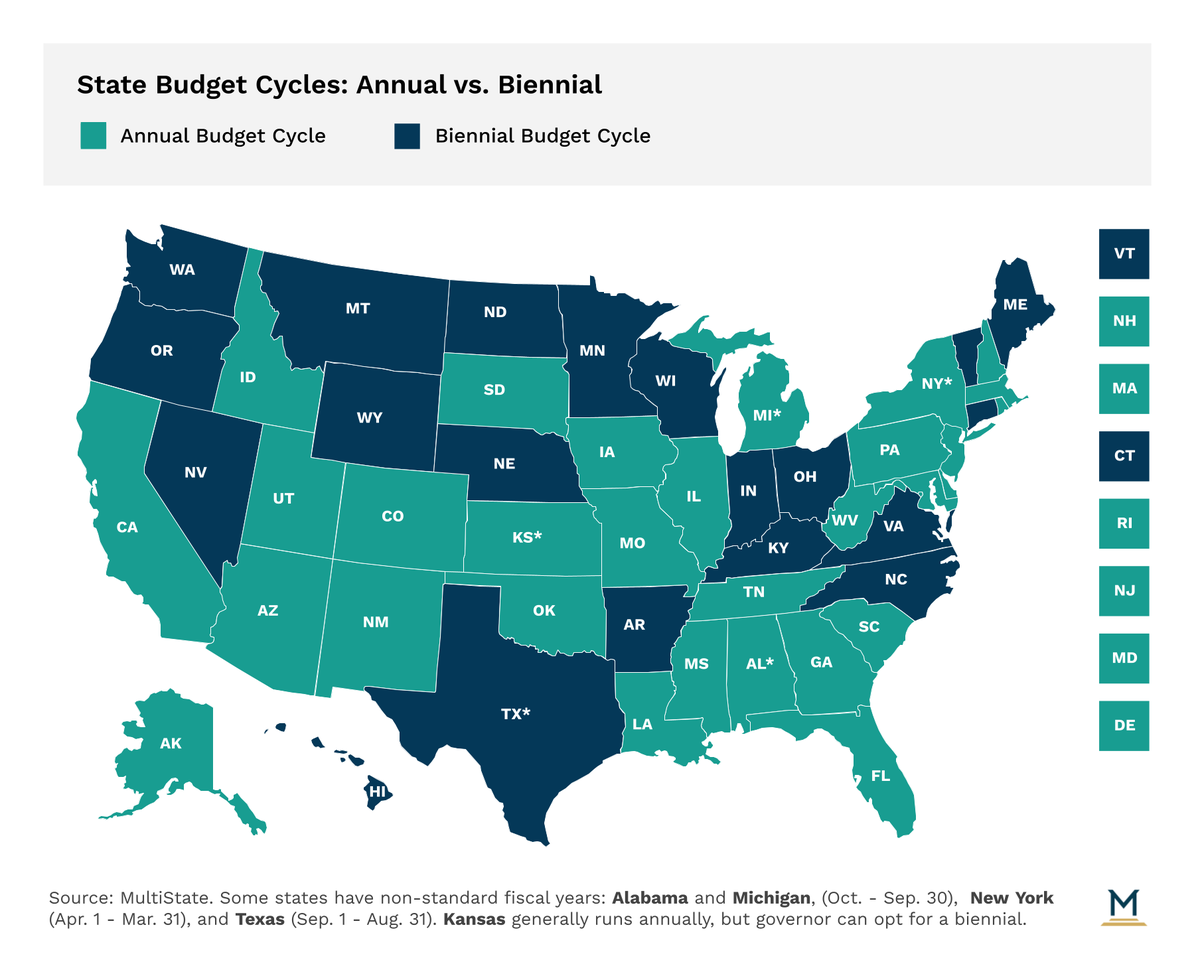
Technology & Privacy, Tax & Budgets, Health Care & Wellness
ICYMI: Major Emerging Legislative Trends in 2025 (Webinar Recap)
April 8, 2025 | Liz Malm
-6d814b-1200px.jpeg)
Key Takeaways:
Springtime means that budget discussions across most states are coming to a head. Generally speaking, state budgets are a nearly year-round process, as revenues, state economies, and national issues are watched throughout the year. A state budget begins in the governor's office, with executive budgets typically released in December or January. Then, the budget is introduced in the legislature, with continued discussions in the months following. The timelines, however, are specific to each state. Keeping track of the flurry of dates can be a challenge. Below, we have collected the movement of budgets in key states, showing how they've progressed so far and when we expect the next steps to be taken.

In California, Governor Newsom (D) released his executive budget on January 10. The Budget Act was introduced as AB 227/SB 65 on the same day. The bills will go through the budget committees, with hearings proceeding through the spring. By May 14, the budget will be revised based on economic forecasts. The constitutional deadline for the legislature to pass the budget bill is June 15.
In Texas, Governor Abbott (R) submitted his budget proposal on February 2. Over the past two months, the legislature has held hearings. In April, the markup process begins, with final amendments being made in the individual houses and in a conference committee. The final budget bill must be passed by the end of session on June 2 and, if approved, goes into effect at the beginning of Texas' fiscal year in September.
In Florida, Governor DeSantis (R) released his executive budget on February 3. Budget bills were introduced in the House last week. Tax-focused budget bills are expected shortly. Over the next month, lawmakers in Tallahassee will debate the budget before its passage, which must occur before the end of session on May 2. After passage, the governor will have fifteen days to approve the budget, retaining the power to make line-item vetoes. Republicans have a supermajority, giving legislators the two-third majority they need to override vetoes by DeSantis.
In New York, Governor Hochul (D) unveiled her budget on January 21, which was introduced as A 3009 and S 3009. The "one house" budgets, in which the Senate and Assembly were released on March 11. The differing priorities between the Senate, Assembly, and Executive Mansion are being deliberated. New York’s deadline for the budget is April 1, which has already passed. To provide for more time, three budget extenders have already been passed.
In Illinois, Governor Pritzker (D) submitted his proposal on February 19. The budget will now undergo months of deliberation. While the deadline to pass the budget is June 15 to meet the July 1 start of the fiscal year, if the budget is not passed by May 31, then a three-fifths legislative majority is required for approval.
Virginia's biennial budget is passed in even-numbered years. In odd-numbered years, such as this one, amendments to the biennial budget are written. The bill is introduced to the General Assembly in December, followed by amendments by the House and Senate in January and February. This year, the bill was delivered to the governor in early March. On March 24, Gov. Youngkin (R) sent the budget back to the General Assembly with eight line-item vetoes and 205 amendments. Legislators reconvened in Richmond to reject all but 33 of Youngkin's amendments on April 4. The governor has 30 days to sign or veto the amended budget.
In Washington, the governor proposes his budget in December. Former Gov. Jay Inslee (D) released his executive budget on December 17. The legislature debates the budget during the initial months of the session, with debate concluding before sine die in late April, with the governor signing shortly after. Lawmakers in Olympia are still debating which taxes to levy after Gov. Bob Ferguson threw out the legislature's"intangible assets property tax" proposal to tax wealth.
In Maryland, Governor Moore's (D) executive budget was released on January 16. The Budget Reconciliation and Financing Act (BRFA) was introduced as HB 352/SB 321 the same day. After a lengthy and contentious hearing and amendment process, the budget passed the House on March 26. The Senate passed the budget with further amendments on April 1. Currently, the budget is being reviewed by a conference committee to enroll the final version for Moore to sign.

April 8, 2025 | Liz Malm

April 8, 2025 | Andrew Jones

February 28, 2025 | Bill Kramer